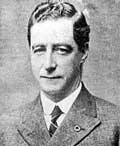Charles Burgess (Cathal Brugha) studied at Belvedere College, Dublin, but had to leave when his father's business failed. He worked as clerk in a church supplies firm and later became a cofounder of Lalor Ltd., candle manufacture. He joined the Gaelic League in 1899 and became lieutenant in the Irish Volunteers in 1913. During the Easter Rising of 1916, Brugha was second in command at South Dublin Union and was severely wounded. As chief of staff of the Irish Republican Army (Oct 1917 - Apr 1919), Brugha took leading part in the War of Independence. As a representative of Sinn Féin party, Brugha was elected to the House of Commons for the rural seat of West Waterford in December 1918. On 21 Jan 1919 Sinn Féin members of Parliament met in Dublin. Count Plunkett proposed that Cathal Brugha should preside the meeting as Chairman (Ceann Conhairle) and he assumed the chair with general consent. The meeting declared itself Dáil Éireann, the Irish parliament, and adopted the Declaration of Independence. The next meeting of Dáil Éireann elected Brugha "President of the Ministry pro. tem." (22 Jan 1919), but on 1 Apr 1919 he and his government resigned to make way for Eamon de Valera, who succeeded Brugha as head of state. Brugha was appointed Secretary of National Defense (2 Apr 1919 - 9 Jan 1922). He voted against the Anglo-Irish Treaty in January 1922 and was replaced as secretary by Richard Mulcahy. Brugha took the side of Republicans in the Civil War and was fatally wounded during a week of street fighting between supporters and opponents of the Anglo-Irish Treaty. Biography source: [3] |

